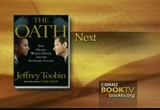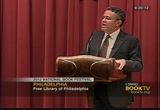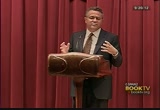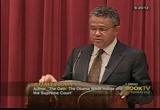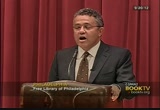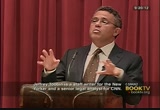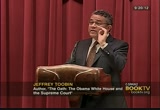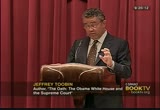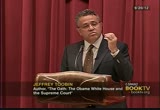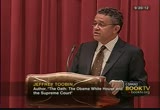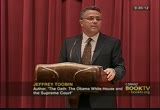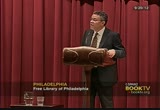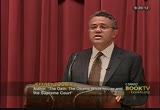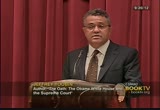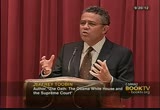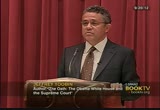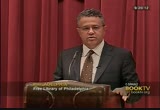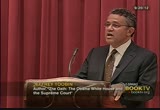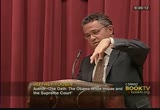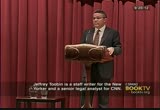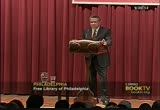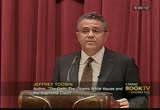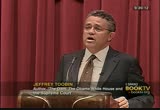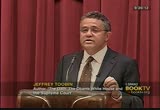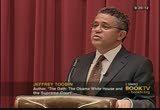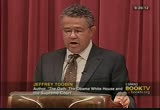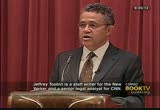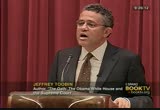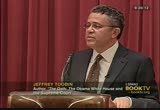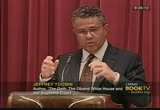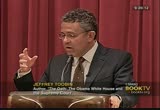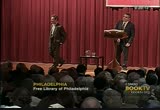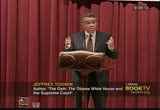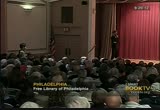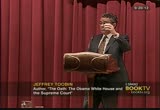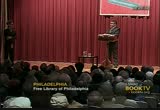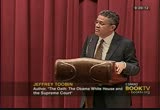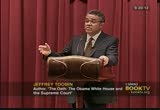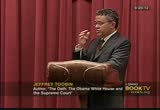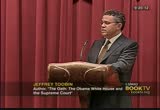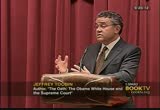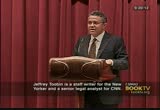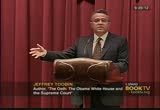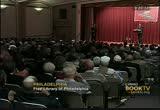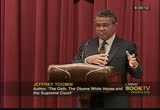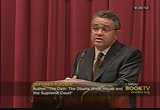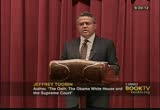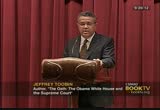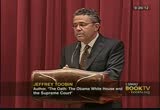tv Book TV CSPAN October 1, 2012 7:00am-8:00am EDT
7:00 am
administration and the u.s. supreme court bar he examines the recent addition of four justices in the past five years and how it has affected the course decisions on numerous cases, including its recent ruling on health care. it's about an hour. [applause] >> thank you, mark. hello, everybody. so excited to be here in philadelphia. i am not myself in philadelphia, but my dad, jerry, was overbrook high school -- [applause] a lot of pandering has just begun. curtis institute, any other violinists? and he went to temple as well.
7:01 am
and he taught me that the streets were paved with pastry cakes. i have enjoyed my visit ever since. i'm really happy to be talking about "the oath" today. it only came out two days ago. so far so good. and it's exciting to finally get to work on these books. people read them. it's interesting. it's exciting. so let me start by asking the first question that i know is on your mind, which is who is your favorite justice? it's not a lame it. she has to earn it. she's only been there a year and a half so far. i'm still struggling with the question, because for so long my favorite justice was david souter.
7:02 am
because he was so delightfully odd, that he didn't have a cell phone. he didn't have the computer. he didn't have an answering machine on its own. he was late for william rehnquist funeral because they couldn't with a message and find out where he was. each doesn't like electric light. he moves his chair around his office over the course of the day to catch the sunlight. true story. but the great thing about justice souter was that he sort of got the joke about being the supreme court justice. he understood that he sort of was important but it wasn't really all about him. and i'll just give you one example of that. for reasons that remain obscure, david souter and stephen breyer are frequently mistaken for each other. if you know what to look like they really don't look anything alike, but people on have a vague sense of who the justices are. one time not too long ago justice souter was driving from washington to his home in new
7:03 am
hampshire and he stopped at a restaurant is something to eat. and a couple keep up to and because i know you, you're on the supreme court, right? he said just. he said your stephen breyer, right. and he didn't want to embarrass fell and he suggested i'm stephen breyer. fife nhs for had for a while and the guy, the guy said justice breyer, what's the best thing about being on the supreme court. he thought forum and any so i have to say it's the privilege of serving with david souter. [laughter] how can you not love a guy like that? i'm taking nominations for my favorite justice after that. so let's talk about the current supreme court by the numbers for starters. they are or men and three women, first time in history there's three women on the court. [applause] there are six catholics, three jews, no applause?
7:04 am
no protestant for the first time, first time in history. but our representatives of four new york city boroughs on the supreme court. there is justice sotomayor from the bronx, justice scalia from queens, justice ginsburg from brooklyn, and justin kagan from manhattan. tragically staten island is unrepresented on the supreme court. but you never know when to might be vacancies and we might address that. there are six products of harvard law school in three parts of yale law school on the supreme court for corporately no other law schools in the united states. [laughter] besides those two. it is a bizarre and unfortunate fact i think. but those are help interesting facts about the supreme court. but, frankly, i don't think they're very important. here's an important fact about the supreme court. there are five republicans and four democrats.
7:05 am
i will speak for somewhat longer, but this is basically all you need to know. [laughter] if there's a take away here, i've gotten to the point early. there are five republicans and four democrats, and that really tells you much of what you need to know. and it is true that the justices wear robes because they're supposed to look all alike, and this was, you know, supposed to give the perception that they're all pretty much the same. but just as on the other side of first street, the united states congress is deeply divided, according to party, so was the united states supreme court. and this is a moment of real partisan division at the supreme court. and that is exemplified in case after case. why this moment is so important
7:06 am
i think, you need to go back in history of the supreme court to a different period in the court, to the mid '60s, and the late '60s because that was the last time the supreme court was really a unified ideological force. it was not divided summarily. there were seven liberals on the supreme court, the late dates of the warren court. and there was a real liberal agenda. every saturday morning chief justice warren and his great deputy meet together and they would say what cases do we want to take, what do we want to move along? they had ideas about how to move the law. year after year they changed cases -- they changed the law. 1964, justice brennan's famous opinion in your times against sullivan revolutionized by the law. 1965 justice william o. douglas, griswold v. connecticut, the case that established the right
7:07 am
to privacy that married couples should not be denied the right to buy birth control. 1966, miranda versus arizona, revolutionizing criminal procedure and perhaps more importantly changing television dramas for ever. [laughter] >> 1967, perhaps the best named case in supreme court history, loving v. virginia. what was it about? it was the case that said states could no longer ban racial intermarriage. think about that, 1967. there are people in this room who were on live in 1967. [laughter] and it was still illegal in a lot of states for racial intermarriage. when barack obama's parents got married in kenya, i'm sorry, i
7:08 am
mean -- if such a cheap joke and i apologize for that but it does remind me, you know, everybody knows mitt romney is having a rough patch as presidential candidate, but all right, all right. but a sentence i have not heard uttered anywhere is, if only donald trump had been the nominee. [laughter] because as you recall he sort of build his campaign around the idea that barack obama was born in kenya, or somewhere other than the united states. but that campaign could not take off exactly. mitt romney is therefore better or worse. and in all seriousness, when barack obama's parents got married in 1960, it wasn't in kenya. it was in hawaii. they got married in hawaii.
7:09 am
there were people in prison in this country for racial intermarriage. that's no joke. it was illegal in 20 states in 1960, and it gives you an idea of how much the country has changed in a good way. but right after richard nixon became president, for vacancies appeared on the sprinkler. you never know how that's going to work. jimmy carter is the only president in american history to serve a full term without having a single nominee. there were no vacations while he was there. richard nixon was only president for five and half years. he had to leave early, remember? [laughter] geek out for appointments because chief justice warren left. john hartman and hugo black left. they were replaced by richard nixon with chief justice warren burger, harry blackmun, powell, and william rehnquist. and as you think about that list, it illustrates a theme
7:10 am
that a think, it's a very important part of "the oath" but it is the theme of american politics over the past generation. and that is the evolution of the republican party. it is the most important story in american politics. it is the most important story in the supreme court. because modern republicans dominate the supreme court for two generations, and moderate republicans are gone. they are gone at the supreme court. they are gone in the united states congress. arlen specter as you all know is fighting for his life now. i had the privilege of covering senator specter who is a great character. often during his long tenure in the senate, and he left the republican party literally, but republican party had left him well before that.
7:11 am
and as you look at nixon's appointments to the supreme court, 1970, they thought the court would move way to the right because -- the '70s were almost as liberal as the '60s. what with the big cases? the nixon tapes case. the pentagon cases. they approve school busing. they ended the death penalty in the united states in 1972. a letter back in 1976, and still the most controversial decision of all, 1973 roe v. wade, but said states could no longer ban abortion. it was a seven-2 up in and the only two dissenters and rove v. wade were byron white was appointed by president kennedy and william rehnquist, three of the four next justices were in the majority of will be wait and i think it shows you a lot about where the republican party was in the 1970s.
7:12 am
1975 when douglas stepped out and forward dominic john paul stevens to replace them. in his hearing he was not asked a single question about abortion because he was not part of a political dialogue in the way that later became. the big issue, big change began in 198 1980 that goes with the election of ronald reagan ronald reagan brought with them to washington a very underrated figure in a recent american history, somehow i don't think gets his due as an important person. that's edwin meese because edwin meese at first was in flash and then attorney general. said look, there has been a liberal agenda at the supreme court. there needs to be a conservative agenda at the supreme court. what was that agenda? expand executive power and end racial preferences, speed up execution, welcome religion into the public sphere, and above
7:13 am
all, reverse roe v. wade and allow states once again to ban abortion. a big part of the reagan revolution was the arrival of washington of a group of young and committed conservative lawyers who wanted to work in that, on behalf of that agenda, who were two of the best and the brightest of that group? john roberts and samuel alito. 1970 -- in 1985, a memo at the solicitor general's office, alito wrote what can be made of this opportunity to advance the goal of bringing about the eventual overruling of roe v. wade? later that year, applying for a promotion he wrote i am particularly proud of my contribution to recent cases in which the government has argued in the supreme court that the constitution does not protect the right to abortion. samuel alito then, samuel alito now. but republican party of 1980 was
7:14 am
not the republican party of today either, and we saw that in reagan's nominations to the supreme court. 1981, potter stewart unexpectedly announced his resignation, and reagan had made a campaign promise that jimmy carter didn't even make in the 1980 campaign. he said at the have the chance i will nominate the first woman to the supreme court. reagan said look, i have my chance, go find a qualified woman. it was not a simple thing in those days because they were not a lot of women, especially republican women in the traditional pipelines for supreme court appointments. so reagan's people went all the way to the intermediate appeals court in arizona, not even the arizona supreme court, to find the remarkable figure was and is of sandra day o'connor. sandra day o'connor was not then a social conservative, or anything like the kind of conservative that dominates the
7:15 am
republican party now, and that was fine with ronald reagan. he didn't care. it wasn't his agenda either, and he was very proud of his nomination of o'connor. 1986 chief justice burger stepped down. reagan elevated rehnquist from associate justice to chief justice, named antonin scalia to that seat. no question about it. conservative. the following year, a really key turning point in history of the supreme court. 1987, lewis powell step down. lewis powell was at that point the swing justice. justices don't like when the news media so that term but it's been a useful term for a long time in the supreme court because the court has been so evenly divided for so long. so it was very important. and in 1987, remember president reagan nominated? robert bork.
7:16 am
robert bork, and something important had happened between the nominations of rehnquist and scalia in 86 and the nomination of bork in 1987. in a midterm election, the democrats had retaken controls of the united states, so the chairman of the judiciary committee was no longer strom thurmond, but was instead a young senator from delaware named joseph biden. and biden engineered a really meticulous examination of orcs record. and bork to his credit, perhaps to his regret, engaged the senators in discussion of how he felt about the issues, and it became clear he felt the civil rights act, a thomas just think, he thought there was no such thing as a right to privacy to the constitution, and the senate by a vote of 58-42 said to conservative and he was voted down. ronald reagan nominated instead
7:17 am
to that seat anthony kennedy, who was serving a liberal but was certainly no robert bork either. and he has had a long and distinguished career as, now the swing vote on the court. and that really, that set, that really set up the rehnquist years. accord which i wrote about in my last book, "the nine," and when i started looking at the supreme court in a serious way as a writer, i was inspired by book that i'm sure is familiar to many of you called the brethren by scott armstrong and bob woodward, really a great book, first real behind the scenes book of the supreme court. and 15, the theme of the book was also justices, regardless of politics couldn't stand were in burger. they thought he was at pompous jerk. that sort of contention has been
7:18 am
the rule more than the exception of the history of the supreme court. i don't know how many of you have had the misfortune of your of a chassis from sir from 191 1914-1941 named james mcreynolds was such an appalling anti-semi to use to get up and leave the conference room whenever justice brandeis or justice cardozo would speak. william o. douglas, i can take was a liberal one summer had a terrible car accident, drove his car off a cliff, and the first question i but had back then in the court was whether lewis -- where was frank-footer at the time? they hated each other so much they thought frankfurter might have driven him off. [laughter] i was hoping as a journalist that i would find this cd center of the rehnquist court, the hatred therein. well, to my great disappointment as a journalist but somewhat to my satisfaction as a citizen i
7:19 am
learned that rehnquist was actually very popular among his colleagues. he basically created a rule that good fences make good neighbors. he didn't harass anybody. everybody left each other alone. they voted, and rehnquist, you know, didn't force anyone to vote the way they didn't want to vote, and that was it. another think rehnquist did, in the 1980s, the court was deciding about 150 cases a year. by the time rehnquist died, they were deciding about 80 cases a year. now do the math. 80 cases divided by nine justices, divided by four law clerks of peace, no wonder they live so long, right? it's a pretty cushy job in on the supreme court. there's just at the many cases. in the '80s, the caseload had gotten so big there was a proposal for the court to have come to create a new super
7:20 am
intermediate appeals court between the circuit courts and the supreme court. and chief justice burger like this idea, and it went to the white house counsel's office for evaluation. the white house counsel assigned a young member of the staff name john roberts to evaluate this new proposal and this is an excerpt from the memo that roberts wrote, that while some of the tales of woe emanating from the court are enough to bring tears to the eyes, it is true that our supreme court justices and schoolchildren are expected to end to take the entire summer off. [laughter] the chief justice doesn't feel this, this way anymore. is much more in favor of taking the summer off. especially this summer, he wanted the summer off. and it is true that under chief justice roberts the court remains a congenial place. and to see that the court is a
7:21 am
congenial place, you need only go watch a supreme court argument. i'm sure, many of you have done that. if you have not i really encourage you. it is really the best free show in washington. it's very entertaining, very illuminating, and there is of course one very well known fact about supreme court oral arguments. and that is the art a justices who are very engaged and very prepared and ask lots of hard questions. and we are now in year seven of clarence thomas' reign of silence. february 22, 2006, yes, that's right, the last time you asked a question. those of us who go to arguments regularly, they are -- there's not that many of them up there.
7:22 am
the press section is right next to justice sotomayor. thomas is right next to her. thing, will this be the day? [laughter] it never is. it just never is. but this is why he still. this is why you should go is because you see that justice thomas is not silent. they said, you know, he passes notes with his colleagues. justice thomas is not an unpopular or uninfluenced member of the supreme court. he's actually a very significant force on the supreme court. he just chooses for his own bizarre reasons not to never ask any questions. just be converted about the rehnquist court, i think it is useful to think about the rehnquist court in two parts. 1986-2000, and 2000-2005, the
7:23 am
dividing point in history of the court in many respects is a dividing point in the history of the country and the court's decision in bush v. gore. now, justice scalia does a lot of public speaking, and he's often asked a kind of hostile questions about bush v. gore. why did you do bush v. gore? and he always says the same thing. oh, get over it. [laughter] well, speaking just myself, i am so not over it. [applause] >> four i wrote "the nine" i wrote, i wrote a book called too close to call about the recount in florida. it had a big part in bush v. gore, and one thing i try to do in reporting that book was interview al gore. obviously, you want to interview al gore.
7:24 am
he wouldn't talk to me. i tried everything. he didn't want to relive the expense. just by coincidence i met al gore while i was working on "the nine" and i said to him, he had read "too close to close." we're talking about that. i said, i'm writing another book where bush v. gore is at the center of it. i said i think i'm the biggest bush v. gore junkie in the world. and he said you may be second. [laughter] you know, i think you got a point. i have to agree. but i don't want to spend too much time on bush v. gore today but the bush v. gore had a not predictable -- the fact that very good at protections as you know. will get to that a little later. the legacy of the supreme court, as you know, i think you all
7:25 am
know, bush won that case, and but the court from 2000-2005 moved to the left. the court got more liberal. same nine justices. why? think about the cases. they decided to end of the death penalty for the mentally retarded. ended the death penalty for juvenile offenders. they decide in texas, gay people could no longer be thrown in prison for having consensual sex my. they saved affirmative-action in the case of the university of michigan law school. and in case after case they rejected the bush administration's position on guantánamo bay, and the treatment of detainees there. so why did the court move left? the court move to left because sandra day o'connor's group more and more alienated from the modern republican party. she didn't like john ash grove.
7:26 am
should invite the way the war in iraq was being conducted, and above all she was alienated by something that doesn't get talked a lot about now but i think is very large in the history of our country, not just the supreme court, and that's the terri schiavo case. terri schiavo case had a big impact on justice o'connor, as someone who believes in judicial independence by someone who is also dealing with, although many people did not know at the time, but the scent of her husband -- so the idea of medical decision-making for critically ill person was not just a distraction for justice o'connor, an effect in 2005 she left the court to take care of her husband. and she was replaced ultimately i only do.
7:27 am
-- justice alito. and the court now reflects the modern republican party. it is worth pausing to think about the last three justices who left the supreme court. sandra day o'connor, david souter, and john paul stevens. three more different human beings you will never meet. sandra day o'connor, tall, charismatic, outgoing politician from arizona. david souter, the shy reclusive bachelor from the other side of the country from new hampshire. john paul stevens, the why the antitrust lawyer from the middle of the country, from chicago. but what do they have in common? they were all moderate republicans. they were all moderate republicans who left the court deeply and totally alienated from the modern republican party. in trenton i tells the story of
7:28 am
justice o'connor and justice o'connor and justice souter having a conversation in the hallway of the supreme court. and o'connor boiling with frustration about how, as she said, why is it that our party is destroyed the country? why are we spending money that we don't have? why are we engaged in this war in iraq with no end? and barry goldwater, she said, never gave a damn who you slept with. and that was the party now who does give a damn. and it is, stephen breyer said, after the court decided the seattle and louisville, desegregation case, overturned those, he said it is not often in law that so few have quickly undone so much. and that was even before
7:29 am
citizens united, which i think is the defining case so far of the roberts court. now remember, the conservative of the '60s, the '70s, moderate republicans in the senate and court, the core idea of conservatives at the supreme court was judicial restraint. the idea that courts should, if at all possible, defer to the elected ranges of government. should not overturn law. and it was the liberals who are always trying to overturn law. and it was potter stewart and lewis powell and sandra day o'connor who were preaching judicial restraint. but citizens united was a case where just a few years earlier, george w. bush had signed the mccain-feingold law or in just two years earlier, or more than two as i think, for years
7:30 am
earlier the supreme court has affirmed the constitutionality of the mccain-feingold law. but in a story i tell at greater length in trenton, the conservative majority converted a relatively minor dispute over an obscure film put out by a nonprofit corporation into a complete rewriting of our campaign finance laws, based on the dual metaphors that corporations are people, and money is speech. and those two ideas are at the heart of citizens united, and they are the story -- and that decision is very much the story of the 2012 presidential and perhaps even more importantly, lower about race -- lower ballot
7:31 am
raise. that brings us to the health care case you're now, there were some so-called experts and pundits who watched the oral argument of that case and said well, it's quite clear that the law is going to be overturned because of the questions. and in my defense -- [laughter] i would just like to say, you know, whatever, okay? [laughter] it was basic cable, all right? you don't pay extra for cnn. [laughter] and everything. no, it was somewhat more informed decision than it. i thought the law was going to be overturned based on the oral arguments in part, because in my experience and rehnquist and roberts court this is not accord with the they play a lot of devils advocate.
7:32 am
they use oral arguments. their questions to make their case to the colleagues, and it sure looked to me during most of the arguments that the five conservatives were very much leaning against the obama administration on the key argument in the case, which was uzbek commerce clause of article one of congress to pass the individual mandate. which says individuals have to get health insurance. and as i sat in court on june 28 and heard chief justice roberts announce his decision in the case, i learned the edge to the question, which was no, it doesn't. the commerce clause does not allow the court, the congress to invoke an individual mandate. but then any decision that stunned many people, but no one more than me, john roberts reached for a subsidiary argument that had only been
7:33 am
upended, had only been mentioned in passing in both the supreme court and even the lower courts and he said the individual mandate was a permissible use of taxing power of congress and not the commerce clause, and thus the law would be upheld. subquestion finally anticipate why, why did roberts do that? and i think there were three main reasons. one is, i think you have to take his opinion at face value. eastham thought it was a legitimate use of the taxing power. i think the second and third part more important. the second and third are that, the second is that john roberts saw health care as many people saw health care, as the third in a trilogy of cases, starting with bush v. gore in 2000, citizens united in 2010, obamacare in 2012 your and that, in those first two cases you had
7:34 am
five republicans justices dashing the dreams of democrats in what would seem to many as a very partisan case. as they sat down to vote on health care, it looked like the same thing was going to happen. the five republican nominees were going to trash a democratic dream. roberts recoiled from that ip. roberts has a very keen sense of politics in the larger sense. and he knew and cared deeply that the supreme court not be regarded as simply another branch of congress, where democrats and republicans fight. he wanted the court to be seen, if at all possible, as somewhat elevated from the discourse. plus, the third reason worth remembering, that republican
7:35 am
conservative agenda for the supreme court that i talked about earlier on that it needs brought with them, expand executive power, end racial preferences, you know, and above all reversed roe v. wade. the commerce clause was not part of that agenda. again, in a story i tell in trenton, the idea that an individual mandate was unconstitutional was invented out of thin air a century six months before the law was passed. the individual mandate had been an idea pioneered by the conservative heritage foundation in the late '80s. dedicated been discussed and no one had ever suggested it was unconstitutional. now, you might think, someone might've noticed as if it really was unconstitutional doing all that time, but it was an example, i think and i believe roberts made, kind of a
7:36 am
political frenzy, a kind of decide on the part of republicans to just defeat this law at any cost, at any price, and roberts said, this is a diversion from what we need to do as conservatives. roberts did not suddenly last june discover his inner moderate. [laughter] he is not a moderate. is not going to suddenly start siding with the more liberals in other cases. but in this case he preserved his place. he preserved the courts place, as a relatively neutral arbiter and expanded his own power and reputation enormously, which he will use sooner rather than later to advance the conservative goals that he cares so much about. at least that's what i think. and with that, why do we take some questions? [applause]
7:37 am
>> thank you. why don't we start right there. wait for the mic phone and hold the microphone close to your mouth. >> would you distinguish between justices that are pointed by republicans and democratic presidents as opposed to what you termed republican and democratic justices? >> i think particularly today that is largely a distinction without a difference. the supreme court is -- nobody is confused about the importance of the supreme court. i know it is confused about the importance of ideology in the supreme court. the difference between ruth bader ginsburg and antonin scalia is not that one is smart and one is done under in -- one is done. they are both intelligent, good
7:38 am
lawyers and ethical. they just see the constitution in different ways. and that is inevitable. you cannot look at questions like does the constitution protect a woman's right to an abortion? may race be used in college admissions? those are as much political questions asked legal questions. that justice gets the republican president are different from you get as a democratic justice. >> why don't you decide because it's too great a responsibility for many. [laughter] >> my question is, article iii calls the supreme court supreme, and supremacy is very fragile.
7:39 am
justice jackson's book, the struggle for supremacy. do you think that john roberts is mindful of his place in history, not going to be the key factor in destroying the so-called supremacy of the supreme court? >> you know, i do think that the larger point you are referring to, which is that roberts cares about his legacy and the place of the court in american life of government is very important. i am highly confident, in the durability of judicial supremacy at this point. look, if this court can survive bush v. gore, it can survive anything. talk about a transparently political division to damage the credibility of the court. but, you know, they were just as powerful the next as they were that day. and i don't think that if
7:40 am
roberts had voted with his conservative colleagues in the obamnicare case, that the court would have suddenly lost judicial supremacy, it would've lost some of its reputation. i think roberts cares about that, but john marshall decided madison case in 1803. the superiority, the right of the supreme court to declare law unconstitutional has been unchallenged since that point and i don't think even a bad decision -- [inaudible]. >> do you think that if obama is reelected that ruth bader ginsburg will step down? and are there any other justices that you think might consider withdrawing from the supreme court? >> the answer is, resignation decisions are very political in
7:41 am
the sense that justice is decide to leave when a president to their liking is in a position to appoint them. ruth ginsburg is a great fan of president obama, and i do think she will leave probably in obama's third year. she is 79. she is often said she wants to search use 82 because that's when louis brandeis, her idol, served until. not funny, that's true. and some people ask why didn't she quit earlier to make sure that obama bashing she's a human being. and she's a widow. and she loves what she does and she's good at it. she's got the brains and the health did it. she's particularly and members of for new college, elena kagan. and her choice is to be the senior liberal on the supreme court, or go sit by herself in
7:42 am
her apartment near watergate. what would you do? [laughter] so i think she's going to stay. now, if obama is reelected, and it's looking that way, i don't think, i don't, i was not pandering. just making another one of my actual predictions. [laughter] -- excellent predictions. i don't think any of the conservatives will leave voluntarily. but it started to be a pretty old court. justice kennedy and scalia are both 76. you know, do the math. you don't always get a choice of when you leave, but i think if romney wins, ginsburg will try to hold on for the next four years. and i think if obama wins, kennedy and scalia will try to hold on, but you never know.
7:43 am
>> close observation of chief justice roberts, would you care to stick to what was in the primary famously replied in his confirmation hearings that the job of a justice was just -- [inaudible] >> well, he is want to say that, that is the most quoted thing he has ever said. 80% of the time, critically about him, sort of thrown back at them. look, i think we all, supreme court justices included, perceive ourselves in certain ways and like to perceive our selves and certainly so don't think john roberts gets up and more assess i am a judicial activist, i'm someone who's
7:44 am
trying to we write the laws of the united states, to restore them, you know, to restore them to how i think they ought to be. parenthetically. clarence thomas does wake up and say that. [laughter] and i don't mean that in a critical way. clarence thomas really has a very different attitude toward president than any of the other justices. justice scalia has said this. he said thomas does a very believe in stare decisis, and the role of presidents. he thinks we decide to overturn them all and that's a very different attitude than any of the other justices. roberts i think has an image of himself as someone who is more respectful of precedent that he actually is. i don't think he would actually come is like sitting there line, i'm going to call myself an umpire by mike the commissioner of baseball. but i think he's acted a lot more like the commissioner of baseball.
7:45 am
>> what are some of the reasons you see as explaining the rush away from modern nation at the supreme court level or congress in this country? >> wow, that is a really great question, and that's really sort of a gun is as much political science as anything else. i think a big, a big factor is am i know, i don't want to sound too earthly about this, but the rise of computer redistricting strangely enough, that the members of congress, state legislatures have created congressional seats in the house of representatives that are all democratic or all republican. that are relatively few swing
7:46 am
states. we've seen a bunch of change in the past couple of election, but that's very much been the exception rather than the rule. so minutes of the house of representatives fear primaries more than they fear generate elections by and large. and does they gravitate towards the margins of their parties. that doesn't fully explain the senate, because you can't redistrict the senate, but it is had and he knows impact at the state, state legislature level and the more polarized politics. we have also i think the news media plays a role in this. it used to be that there was a kind of shared set of assumptions and news, everybody watched walter cronkite or huntley and brinkley and they sort of made an effort, you could argue how successful but
7:47 am
played things down the middle. that was true of newspapers as well. and rupert murdoch brought fox news to the united states, which is based more on an english model where in england you have, everybody knows e-guardian is a labor paper at the telegraph is a tory paper and fox news became a republican jim, and msnbc became a liberal channel. and so you have people getting information that was as different as the political views but and i think that contribute to polarization but i think it's a great question and i don't really have, these are ideas but i don't have a complete answer for you. >> do you have an idea that chief justice roberts feels about citizens united? >> i know he voted for it. and, that's a pretty good tipoff right there. [laughter] you know, and he, i talk about this in "the oath."
7:48 am
there was a case out of arizona about a public finds, sort of a successor case, not as big a deal by people asking are they going to cut back on citizens united? are they embarrassed? are the words? no. if you believe that money is speech, and that's more important frankly than the appropriations, but if you believe that money is speech, you pretty much have to deregulate the american campaign. any attempt to limit how much money you can give, to whom you can give money. so i think if the court remains as currently configured we are going to see more decisions of the reagan campaign, not less. we now have this fiction of super pacs where someone can give $10 million to an entity that is not technically the newt gingrich campaign. that's fiction i think will disappear by the next year. so that they will be able to give directly to the campaign. because i think, you know,
7:49 am
that's where they are going. >> [inaudible] >> this is a question on a lighter side. i'm just wondering if you could tell us a little bit about what it's like to be a guest on "morning joe"? [laughter] >> you know, this just kills me. i'm a guest. i'm an employee of cnn. i was on "morning joe" wants, like, our rating so terrible that you can't ask me what it's like to be on cnn? [laughter] i mean, i know our ratings are not that good, but i mean, so terrible. what an awful question. [laughter] i used to get all the time, was
7:50 am
anderson cooper really like? he's a great guy. what's it like being on "morning joe"? it was fine. it was very nice. i mean, as i say, i fully been on once. i was on this week i guess, and you know, i don't know. they seem like nice people. [laughter] >> good evening. thank you for your presentation. it was wonderful. chief justice rehnquist was in his mid '70s when he used the morrison case to pass his right wing legislation through the commerce clause. chief justice roberts is a lot younger now. by using the taxation clause right wing legislation, not in this case, health care clause, what do you envision them using the taxation clause in the future to push the right wing legislation? >> let me try to unpack that a little for an audience that might be as familiar with those terms. there were a couple of cases in
7:51 am
them at the end of rehnquist's tenure what he did, in fact, use in validated certain legislation based on the commerce clause. congress passed a law that said it was a crime to possess a gun within 50 feet of a school, and congress, and they said no, that has nothing to do with commerce. and a lot of people thought that was going to sort be the leading edge of starting to invalidate the commerce. but again i don't want to get too deep in the week year, but starting in the 1930s, the court basically deferred to congress and said if congress easy connection to commerce, we're going to just the for and let congress do that. i really don't think that the presidential importance of the national federation of independent business, the obamnicare case, is all that great. i don't think they're going to suddenly start invalidate laws
7:52 am
on commerce clause grounds but i do think the taxing power argument is going to be all that important. i guess having followed this for a long time now, i'm getting pretty darn cynical about precedent. they follow it when they wanted and they don't follow when they don't want to. and i think what's really important about the obamnicare case is that obamnicare has been upheld, 35 million people are going to get insurance -- 35 million people who wouldn't have gotten its -- [applause] and the other stuff is just conversation for law professors mostly. so that's what i think. >> all the way in the back. >> by the way, i'm going to be on hardball, too. so i'll have another msnbc -- [laughter] so bitter about that question. anyway, go ahead.
7:53 am
[inaudible] >> could you comment on the part of the health care decision that exempted form made states to opt out for medicaid? >> well, part of medicaid, yeah. spent our concern is that's going to have a really devastating intellect and i wonder where that fits in an roberts decision and have any comments on it. >> again, this is a part of the decision. there's been a doctrine at the supreme court that says, congress can offer states money on certain conditions, like to we will give you federal highway money but you have to raise your drinking age to 21, a famous supreme court about that. of course, that was okay. in the obamnicare case, they said -- obamacare case. they said that you have to expand the number of people who are eligible for medicaid, which is medicare is older people,
7:54 am
medicaid is poor people. and they said they cared was too coercive. they said the stakes were -- returning it and was too great so that was a violation of states right. you know, medicaid was, not every state adopted medicaid right away. arizona was the last state to adopt medicaid in 1982. medicaid passed in the 1960s and there is no medicaid 19 -- in arizona until nine team 82. all these governors are talking big now, we are going turn down this money. we don't want the strings attached. but when they want to start balancing their budgets and when they have hospitals and doctors come to them sing, are you insane living all these billions of dollars on the table? there will start to be people,
7:55 am
people, the states will come around but they may not all come around at first. and particularly after 2010 we're all these states including this one included republicans, it may be a somewhat slow process. >> i thought i would test your particular powers one more time. you have a blog, i think was a blog entry in "the new yorker" about the defense of marriage act and the way it will be reviewed. i thought that would be an interesting thing to bring up. >> well, it's really a fascinating moment in the supreme court on that issue because that are two issues, two kinds of cases heading to the supreme court at the same time, and they both relate to same-sex marriage, but the cases themselves are actually quite different. one is a challenge to the constitution of the defense of marriage act.
7:56 am
as i'm sure many of you know, defense of marriage act passed in 1996 says that the federal government will not recognize same-sex marriage under any circumstances, even if they're legal in the state would take place. so this case out of massachusetts, very compelling case, where two women were married. they are just as married as any heterosexual couple in massachusetts to one of them die, as i'm sure you under the internal revenue code, money passes tax-free from one spouse to the other, but because the irs can't recognize same-sex marriage in massachusetts, the surviving spouse have to pay taxes on that money, a considerable amount. so it was a very straight up challenge to that law. the other case that is heading to the supreme court is the proposition a case out of california, and that is much more a challenge to whether the protection clause allows the
7:57 am
expansion of same-sex marriage. it is very much like loving persons virginia in can the state's ban this? are the states allowed to ban same-sex marriage? the doma case, the defense of marriage act case, is a lot easier for the supreme court because it only, it applies in spades that already had same-sex marriage. so they are not imposing same-sex marriage on other states. i actually think they will take the doma case and they will declare it unconstitutional because it is really manifestly unjust. the government has a very hard time explaining why the government needs to do this. i mean, what interest is served by penalizing married couples who happened to be of the same sex? the proposition eight case is a much more dicey proposition,
7:58 am
because if the court, if the case goes up in its current form, and there are ways they could matter what, but if it goes up in the current form it basically is, must the 44 states that don't have same-sex marriage start allowing them? that would be politically incendiary. imagine telling mississippi and alabama and texas oh, by the, you have to start performing same-sex marriages or you're in violation of the constitution. the justices are very unaware of the political risk of there. i think it will deny certiorari on the proposition 80 case, which means same-sex marriage would come to california. that would mean that approximately 20-25% of the people in the country will live in states that have same-sex marriage. and i don't think there is anyone who believes that that number is going to start to
7:59 am
shrink rather than grow. and there are states, i am not particularly knowledgeable about the pennsylvania debate here, but i assume it's not going to happen anytime soon, but, you know, states, illinois, it's a big issue. i think the court will be pleased to let it develop in a state-by-state level, and not get involved in that, in the issue just yet. >> please join me in thanking jeffrey toobin. [applause] >> you can watch this and other programs online at booktv.org. >> you've been watching booktv, 48 hours of the programming beginning saturday morning at 8 a.m. eastern through monday morning at 8 a.m. eastern. nonfic
171 Views
IN COLLECTIONS
CSPAN2 Television Archive
Television Archive  Television Archive News Search Service
Television Archive News Search Service 
Uploaded by TV Archive on

 Live Music Archive
Live Music Archive Librivox Free Audio
Librivox Free Audio Metropolitan Museum
Metropolitan Museum Cleveland Museum of Art
Cleveland Museum of Art Internet Arcade
Internet Arcade Console Living Room
Console Living Room Books to Borrow
Books to Borrow Open Library
Open Library TV News
TV News Understanding 9/11
Understanding 9/11